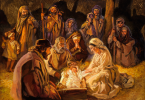
Theme: Our accountability should help us to be responsible in our religiosity.
Scriptures: Ezek. 18:21-28; Ps. 130; Mt. 5:20-26
The prophet Ezekiel received a prophetic call during the time of first deportation of Hebrews to exile (592 BC). Prophet Ezekiel spent most of his time in Jerusalem and exile. The scholars divide the book into three parts based on the themes; namely, threats against Judah and Jerusalem (ch. 1-25), threats against foreign nations (ch. 26-32) and restoration and hope (ch. 33-44). Prophet Ezekiel’s main themes were to dispel the wrong religious beliefs. He emphasised the importance of individual responsibility. The chapter 18 in the book of Ezekiel refuted wrong notion which was based on the famous proverb, “the fathers have eaten sour grapes, and the children’s teeth are set on edge” (Ezk. 18:2). This proverb brought in theory of materialistic fatalism. It made the exilic people live without hope and God. They held their ancestors responsible for their fate. They did not hold themselves responsible for their sinful life. This was an attempt to escape from the responsibility and they accused God for injustice.
In the midst of such wrong popular belief, Prophet Ezekiel asked his people to be more responsible for their own acts because God did not agree with the famous proverb. God wants us to be more responsible. Ezekiel gives two examples. In the first, the wicked man turns away from his sinful life and lives life according to God’s commandments. He says, that man shall live. In the second example, the righteous man begins to live a wicked life then he shall die. In each of these examples, the person is responsible for their choices. God does not punish them because of their ancestors responsible.
Jesus in the Gospel today gives us the same message. He is challenging his disciples to exceeds righteousness than that of scribes and Pharisees. That is the criterion to enter into the kingdom of heaven. Jesus gives various examples. The one that we read today is on the commandment ‘thou shalt not kill’ of the Decalogue. The scribes and Pharisees promoted it because it was a law. Jesus invited his disciples to go beyond it. He told them not to get angry, not to insult them and not to call them fools. He invited to leave the sacrifice behind, in which the scribes and Pharisees took pride, and make peace with the brothers and sisters with whom they had clashed with. This was challenging. It needed the courage to be more accountable towards oneself.
Thus, the readings of the day invite us to be more accountable towards our thoughts and deeds. Let us spend time in the examination of conscience introspecting over our lives during the season of Lent. Is my righteousness exceeding that of the recognized and well appreciated catholic? Am I holding myself accountable for my sinful habits or blaming others and God for my problems? May we change our lives to walk in the foots of our Lord that we may enter into the kingdom of heaven.






